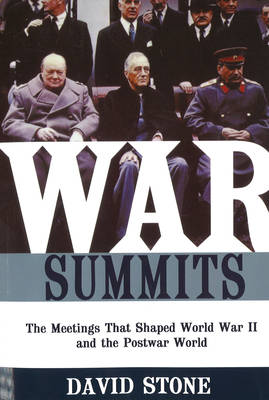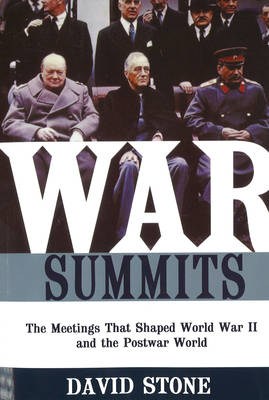
- Retrait gratuit dans votre magasin Club
- 7.000.000 titres dans notre catalogue
- Payer en toute sécurité
- Toujours un magasin près de chez vous
- Retrait gratuit dans votre magasin Club
- 7.000.0000 titres dans notre catalogue
- Payer en toute sécurité
- Toujours un magasin près de chez vous
War Summits
The Meetings That Shaped World War II and the Postwar World
David Stone
Livre broché | Anglais
30,45 €
+ 60 points
Description
Most of World War II's key events have been exhaustively documented and analyzed during the past sixty years, together with virtually every aspect of the lives and actions of the political leaders, the generals, and the millions of military and civilian personnel involved. However, the vital process that provided the political and strategic framework to enable them to direct the war - the Allied war summits - has not been considered in recent times. Comprehensive and authoritative, War Summits charts the problems and the compromises, the discussions and the negotiations, the successes and the failures of the U.S., British, and Soviet allies from 1941 to 1945. David Stone highlights the sometimes less than altruistic national agendas, the well-founded doubts and uncertainties, and the recurring suspicions of Roosevelt, Churchill, and Stalin and their advisers. And Stone relates the strategic planning process directly to its impact upon events on the battlefield and, finally, to the way in which the whole post-1945 world - including the United Nations, the nuclear dimension, and the impending Cold War - was directly shaped by the war summits' process. Political and military historians, political leaders involved with foreign affairs and strategic planning, professional military personnel, and general readers of modern history will find this work of compelling interest.
Spécifications
Parties prenantes
- Auteur(s) :
- Editeur:
Contenu
- Nombre de pages :
- 304
- Langue:
- Anglais
Caractéristiques
- EAN:
- 9781574889024
- Date de parution :
- 01-08-06
- Format:
- Livre broché
- Format numérique:
- Trade paperback (VS)
- Dimensions :
- 151 mm x 226 mm
- Poids :
- 471 g

Les avis
Nous publions uniquement les avis qui respectent les conditions requises. Consultez nos conditions pour les avis.






